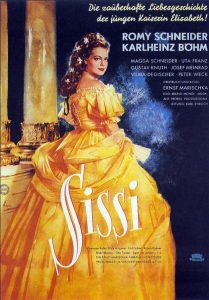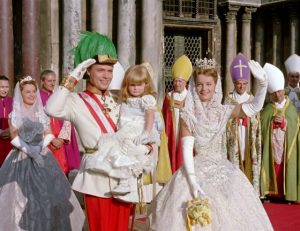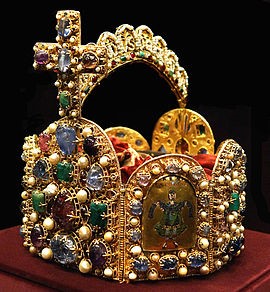Empress Diaries
How many TGForum readers have ever fantasized about being a princess? (Don’t let’s all raise our hands at once, ladies!) For most of us, I would imagine that the visible representative of royal glamor currently goes to Princess Kate of Great Britain. Even the present author — a historically-minded lass of partially Irish heritage — is compelled to acknowledge that the future queen consort of England fulfills every visual expectation of a princess.
Although we readers in the United States mark the birth of our republican nation with its 1776 declaration of independence from King George III and the British Empire, monarchy has historically been the rule in civilization. When the ancient Israelites demanded “a king to judge us, as all nations have” (1 Kgs 8:5) back in the 11th Century BC, the clear implication was that royal rule was already a long established governmental practice.
Our own civilization derives its political origins from the Greco-Roman world. Rome itself was founded as a city-state in 753 BC. One can chart its growth from a small kingdom, into a vigorous republic in 509 BC, and finally into a multinational empire in 27 BC under Augustus Caesar, adopted son of Julius. Like any civilization, it grew, reached its peak and declined.
With the collapse of the Western Roman Empire in 476 AD, the Latin-speaking west no longer had meaningful central authority in any sense, and gradually broke apart. Local territorial rulers actually began to re-establish kingdoms — rex (king) having been an officially proscribed title in Rome since the Republic — in the formerly imperial areas corresponding to present-day England, France, Spain, Portugal, Italy and western Germany.
After several centuries of upheaval, the Empire was restored in 800, when Frankish leader Charlemagne was crowned Holy Roman Emperor by Pope Leo III. With the imperial coronation of Otto I in 962, the empire received its first Saxon monarch. This “Kaiser” (in the German-accented title of Caesar) nominally governed a realm that includes modern Germany, Austria, Switzerland, Belgium, Netherlands, the Czech Republic and northern Italy.
The House of Habsburg eventually obtained the imperial office in the 15th Century. From then on, except for a brief interlude in the 1740s, Austrian monarchs (including the legendary Maria Theresa, an early and active proponent of inoculation against smallpox) ruled the empire during periods of expansion, transition and decline until 1918, when military defeat and political collapse after the First World War brought about its downfall. Thus went the last heir of the western imperial tradition — at least for now.
We’ve all seen movies depicting royals, including lighthearted fare like The Princess Diaries, Roman Holiday, and the ever-popular Cinderella, to sweeping epics such as Nicholas & Alexandra. I’ve enjoyed many, wondering what life would really be like as a princess, or even as a queen. Could I wield social and political influence? If I were to rule, would I rule wisely? Would I be a cultural and fashion icon? (Wow — what would my wardrobe look like?)
My own unambiguous royal film favorite is a foreign series about Elisabeth (Sisi), Austrian empress from 1854 to 1898. Her iconic portrayal by Romy Schneider highlights an extremely popular movie trilogy that immediately made her an international film star. For anyone with a feminine orientation — or who simply appreciates beauty — the movies are manna from heaven. They continue to be televised every Christmas season in Germany, Austria, Switzerland and Hungary.
 As a history buff, cinephile, fashion lover, and aspiring German student, I decided to give them a try some years ago after receiving an online recommendation based on my prior DVD viewing history. From its description, I was expecting good, sentimental 1950s entertainment, where all conflicts are happily resolved by the closing credits — the southern German equivalent of Mom, baseball and apple pie. They were indeed all that, and yet simultaneously much deeper and more thoughtful.
As a history buff, cinephile, fashion lover, and aspiring German student, I decided to give them a try some years ago after receiving an online recommendation based on my prior DVD viewing history. From its description, I was expecting good, sentimental 1950s entertainment, where all conflicts are happily resolved by the closing credits — the southern German equivalent of Mom, baseball and apple pie. They were indeed all that, and yet simultaneously much deeper and more thoughtful.
The first part of the Sissi trilogy was released in December 1955, and is very accessible to foreign audiences with little knowledge of (or interest in) history. It takes place in 1853-54, and depicts the admittedly glamorized version of the real-life courtship of Princess Elisabeth of Bavaria by Austrian Emperor Franz Josef.
The glorious color, fun humor, breathtaking Alpine landscapes, gorgeous gowns, smart uniforms, waltzing, castles and palaces — concluding with an imperial wedding ceremony in a marvelous medieval setting — are simply feasts for the senses. Upon renting this one DVD, I was blown away at first viewing, and watched it multiple times before I was finally willing to send it back (and then only after I learned that the entire series could be purchased online)! Now, after dozens of viewings, I have seen my language skills dramatically improve along the way.
The trilogy continued in 1956 with Sissi: The Young Empress, in which Sissi struggles to find her place in the unfamiliar protocol of the imperial court in Vienna. She begins a family and navigates personal and political challenges, culminating in her additional coronation and acclamation as Queen of Hungary.
The final installment was released in 1957 as Sissi: Fateful Years of an Empress. Sissi successfully endures family strife, sickness, and solitude, prior to a happy reconciliation, recovery and reunion — symbolized by a magnificent imperial gondola entry into Venice, to win the sympathies of the Empire’s then-restive northern Italian subjects.
Like many 1950s cultural icons, Romy Schneider suffered a less than happy personal life, dying prematurely in 1981. But in these movies, we see only young Romy breathing vitality and freshness into a 19th Century character, much to the joy and delight of her audiences (present writer included). Women I share this series with are always thrilled to discover something so beautiful that they never previously knew existed.
Romy was offered today’s equivalent of millions of dollars for a fourth installment in 1958, but walked away to pursue other roles, at which time the series came to an end. As it is, the trilogy can be enjoyed by all ages; even difficult subjects are treated with a gentleness and delicacy no longer evident in today’s movie industry.
It was only after watching the trilogy that I finally began to understand why acting so appeals to girls. If one could have the opportunity to be dressed up in beautiful costumes, travel to exotic locales and costar with dashing leading men, then any girl in her right mind would certainly wish to sign up as an actress.
 It also inspired me to wonder: Why is there a seemingly endless fascination for monarchy among citizens of the otherwise professedly egalitarian American Republic? Obviously the glamor, splendor and pageantry appeals to anyone with a feminine temperament or a traditional mindset. Certainly, there must also be a sense of exoticism, since our exposure to royalty is limited to foreign media coverage, or cinematic storylines.
It also inspired me to wonder: Why is there a seemingly endless fascination for monarchy among citizens of the otherwise professedly egalitarian American Republic? Obviously the glamor, splendor and pageantry appeals to anyone with a feminine temperament or a traditional mindset. Certainly, there must also be a sense of exoticism, since our exposure to royalty is limited to foreign media coverage, or cinematic storylines.
Speaking only for myself, what I find most appealing about the monarchical principle — admittedly, at its infrequent best — is that the buck always stops with the monarch. Whether right or wrong, the monarch is an accountable individual with a divine soul and free will, and is therefore responsible for his actions, and can choose to acknowledge and fix his mistakes. It’s his realm, which his direct descendants will inherit.
But in our so-called “democratic society”, where we claim to govern ourselves, it’s incredible — no one ever seems to be responsible for anything. How convenient if it’s all the fault of the executive, or the legislators, or the courts, or the prior administration, or the opposition party, or the media, electors, special interest groups, et cetera, ad infinitum…never with me, or my own choices and actions. (That said, I would, of course, take an Ike or a Gipper over a Henry VIII any day of the week.)

 And I further suppose if I had been a postwar Austrian or West German in the 1950s — surveying a ruined, divided physical and political infrastructure; millions of dead, widows and orphans; and the threat of an atomic third world war hanging overhead like a sword of Damocles — then I too would probably have wanted to wax nostalgic and enjoy something that took me far away from such an everyday existence, if only for a couple of hours.
And I further suppose if I had been a postwar Austrian or West German in the 1950s — surveying a ruined, divided physical and political infrastructure; millions of dead, widows and orphans; and the threat of an atomic third world war hanging overhead like a sword of Damocles — then I too would probably have wanted to wax nostalgic and enjoy something that took me far away from such an everyday existence, if only for a couple of hours.
Perhaps one can be forgiven for hoping that the western imperial tradition will return one day. If it does — and there should be a need for an empress — then I may know a candidate willing to consider the role!
Like to make a comment? Login here and use the comment area below.
Category: Transgender Opinion






